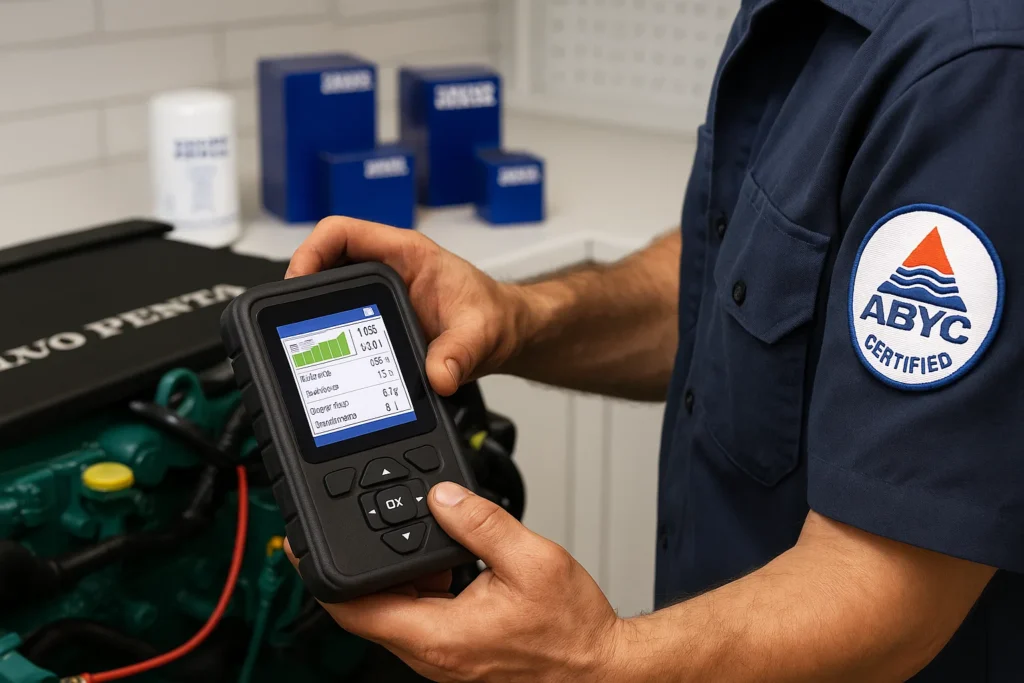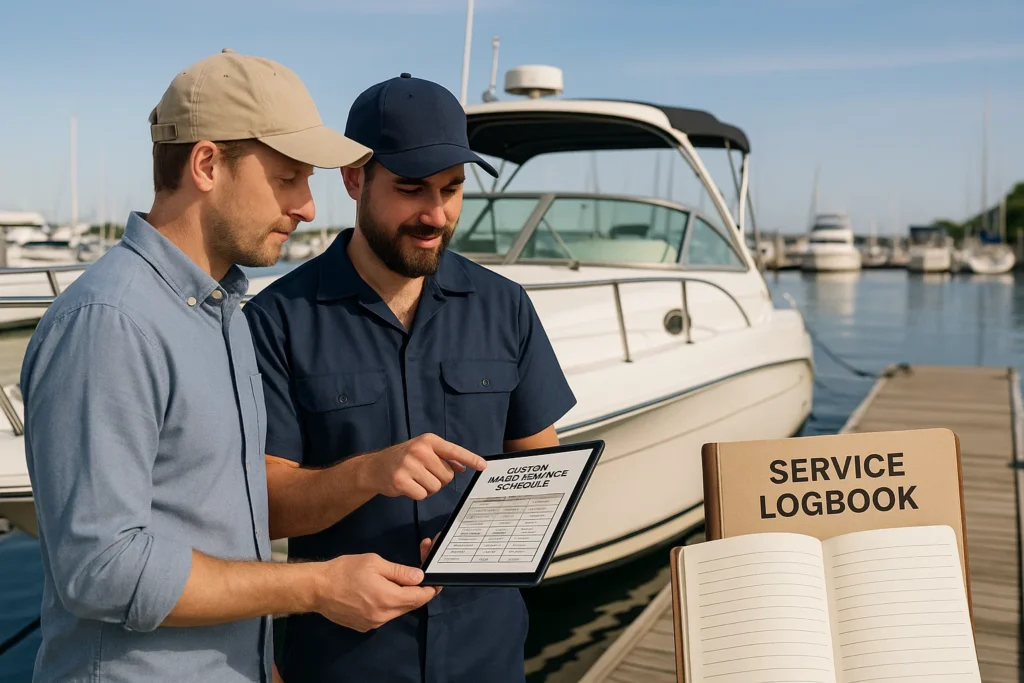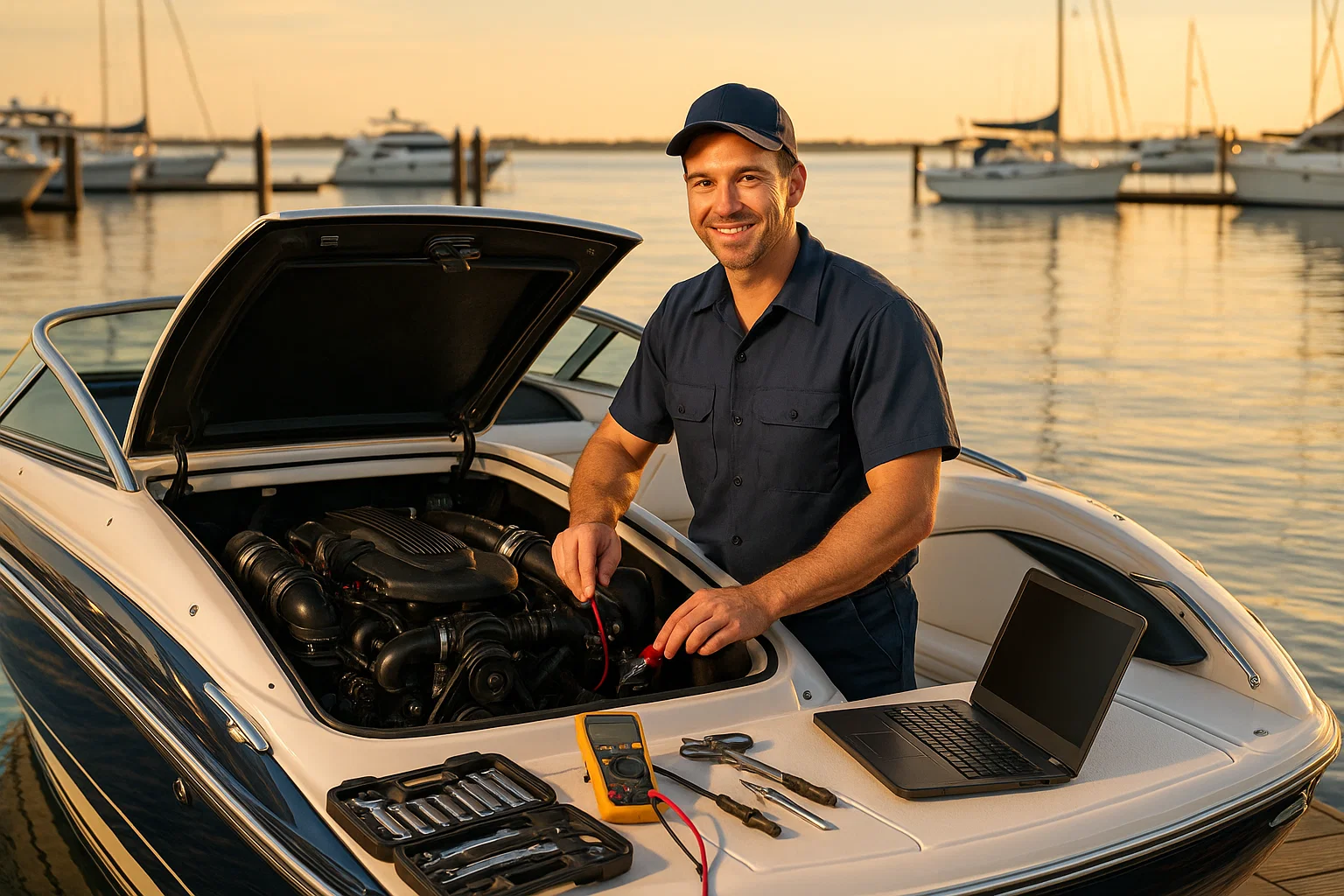Key Takeaways
Finding the right marine mechanic is about more than just a quick fix—it’s about securing a long-term partner for your boat’s health. These essential insights will help you choose with confidence, ensuring you spend more time on the water and less time in the shop. Here’s what you need to know.
- Prioritize certified expertise by choosing shops with technicians holding manufacturer-specific training for your engine brand (e.g., MerCruiser, Volvo Penta, Yanmar).
- Start your search with trusted referrals from fellow boat owners at your marina before turning to detailed online reviews to build your initial shortlist.
- Demand a detailed, written estimate before any work begins, as this transparency on labor and parts costs is a hallmark of a professional operation.
- Evaluate the complete package, not just the price; the lowest quote can signal inferior parts, rushed labor, or an incomplete diagnosis that costs more later.
- Confirm your warranty protection in writing to protect your investment, ensuring it clearly covers both parts and labor for a specified period.
- Shift from reactive fixes to proactive maintenance by partnering with your chosen shop to create a custom service schedule that prevents costly, trip-ruining breakdowns.
- Keep meticulous service records for every repair and maintenance task, as a detailed history will significantly increase your boat’s resale value.
Use these takeaways as your guide to vet local providers and find a true partner for your vessel’s long-term reliability and performance.
Introduction
There are few sounds more frustrating than the sputtering cough of an engine giving up mid-journey or the dead silence when you turn the key at the dock.
That moment of failure is quickly followed by one critical question: Who can you trust to fix it right?
Choosing the wrong marine engine repair service doesn’t just drain your wallet—it can lead to another trip-ruining breakdown just when you think you’re in the clear. Getting it right means more time on the water and less time worrying about what might go wrong.
This guide is your complete roadmap to making a confident choice. We’ll show you exactly how to find a reliable mechanic who respects your boat and your time. You’ll learn:
- The non-negotiable qualities that define a top-tier shop
- A step-by-step process for vetting local providers
- How to understand common repairs and their costs
- What to look for in a warranty to protect your investment
The goal here isn’t just to solve a single problem. It’s about finding a long-term partner for your vessel’s health, giving you the peace of mind that every trip starts with a reliable turn of the key.
The Anatomy of a Top-Tier Marine Engine Repair Service
Not all marine repair shops are created equal. When your time on the water is at stake, you need a service provider whose quality is undeniable.
Think of these non-negotiable qualities as your checklist for identifying a truly professional operation that will restore your boat’s performance and reliability.
Core #1: Certified Expertise and Specialized Experience
A mechanic’s credentials are the foundation of trust. Look for certifications from industry-leading organizations like the American Boat & Yacht Council (ABYC) or the National Marine Manufacturers Association (NMMA).
These credentials prove a commitment to current standards and ongoing education.
Even better is manufacturer-specific training. A technician certified for your specific engine brand understands its unique systems and has access to proprietary diagnostic tools. This expertise is crucial for brands like:
- MerCruiser
- Volvo Penta
- Yanmar
- Cummins
Finally, years of hands-on experience are invaluable. An experienced mechanic can diagnose complex, intermittent issues that newer technicians might miss, getting you back on the water faster.
Core #2: The Quality of the Facility and Materials
A clean, organized, and well-equipped facility is a powerful indicator of a professional operation. It shows respect for your property and a commitment to quality work.
The best shops are transparent about the parts they use. They prioritize Original Equipment Manufacturer (OEM) parts for critical components to ensure a perfect fit and long-term reliability.
Modern marine engines are complex computers. A top-tier shop invests in the latest diagnostic software and tools, allowing for accurate problem-solving that saves you time and money.
Core #3: A Culture of Clear Communication and Transparency
Great service begins with clear communication. From the first phone call, the shop should explain their process, potential costs, and provide regular updates without you having to ask.
Before any work starts, you should receive a detailed, written work order outlining the scope of repairs, estimated labor, and parts costs. A vague final bill is a major red flag.
A trustworthy shop provides a fully itemized invoice detailing every part and labor charge. This transparency is the cornerstone of a great customer relationship.
Choosing a repair shop isn’t just about fixing a single problem—it’s about finding a long-term partner for your boat’s health. Focus on finding a provider who excels in expertise, facility quality, and transparent communication.

Your Step-by-Step Guide to Vetting Local Repair Providers
Knowing what makes a great shop is half the battle. Here’s your practical, step-by-step guide to finding the best one in your area.
Stage 1: Build Your Initial Shortlist
Your search should start with the people you trust most on the water.
Ask for recommendations from fellow boat owners at your local marina or yacht club. A referral from a trusted peer is often the most reliable way to find proven talent.
Next, conduct a strategic online search. Use terms like “Volvo Penta mechanic near me” or “marine engine repair in [Your City]” and focus on businesses with consistently positive, detailed reviews on Google and boating forums.
Don’t just glance at the star rating. Read the actual reviews—both good and bad—to spot patterns related to communication, timeliness, and whether the repair truly solved the problem.
Stage 2: The Deep Dive and First Contact
Once you have a shortlist, it’s time to screen your top candidates. Use the initial phone call to gauge their professionalism and expertise.
Be prepared with a few key questions that get straight to the point:
- Are your technicians certified for my engine brand (e.g., Yanmar, MerCruiser)?
- Do you provide detailed, written estimates before starting work?
- What is your standard warranty on parts and labor?
- What is your current lead time for getting my boat into the shop?
If possible, visit your top choices in person. A quick look at a shop’s cleanliness and organization speaks volumes about their attention to detail and respect for customer property.
Stage 3: Compare Estimates and Make Your Choice
Ask your top two or three shops for a detailed estimate based on the exact same information. This ensures you’re making a true apples-to-apples comparison.
Remember, the lowest price isn’t always the best choice. A suspiciously cheap quote can signal inferior parts, rushed labor, or an incomplete diagnosis that will only cost you more down the line.
Ultimately, you’re choosing a long-term partner, not just a price tag. Evaluate the complete package: the technician’s certified expertise, the quality of communication, and the strength of the warranty offered.
A thorough vetting process helps you move beyond simply finding a mechanic and toward establishing a relationship with a trusted professional. Your goal is to find a partner who will keep your vessel reliable for years to come.
Understanding Common Marine Engine Repairs and Potential Costs
Managing your expectations about the repair process and its costs is crucial. A surprise bill can ruin an otherwise great service experience, so let’s break down what you might encounter.
Understanding your engine’s common failure points is the first step toward diagnosing issues and preventing future breakdowns.
Common Failure Points by Engine Type
Different engine types have their own unique personalities and problems. Knowing what to look for can save you a lot of guesswork.
- Inboard & Sterndrive Engines: These are prone to cooling system issues like worn impellers and clogged heat exchangers. Corrosion on exhaust manifolds and risers is another frequent—and costly—repair.
- Outboard Engines: Watch for fuel system clogs, often due to ethanol in gasoline. Other typical failures include leaky lower unit seals, malfunctioning power trim/tilt systems, and failing electrical components like stators.
Diesel engines have distinct needs, often involving fuel injector servicing or turbocharger issues, while gasoline engines have their own set of common repairs.
How Repair Costs Are Calculated
A final invoice is a story of labor, parts, and expertise. Reputable shops are transparent about how they calculate the final number.
Three main factors determine your bill:
- Labor Rates: This is the mechanic’s hourly rate, which varies by region and specialty. It applies to diagnostics, the physical repair, and any post-repair sea trials needed to confirm the fix.
- The Cost of Parts: Parts for a complex Volvo Penta diesel will naturally cost more than for a small outboard. Shops will also give you options between pricier OEM parts and more affordable aftermarket alternatives.
- Shop & Environmental Fees: Expect minor charges for things like lubricants, solvents, and the proper disposal of old fluids. A professional shop will be upfront about these costs.
Knowing these components helps you read an estimate with confidence. You’re not just paying for a part; you’re investing in the diagnostic time, specialized tools, and expertise required to install it correctly.

Beyond the Repair: Ensuring Warranty Protection and Future Reliability
The job isn’t finished when you pay the bill. Your focus should immediately shift to protecting your investment and ensuring you spend more time on the water and less time dealing with unexpected issues.
A quality repair experience is your gateway to long-term reliability.
The Critical Importance of a Strong Warranty
A warranty isn’t just a piece of paper; it’s the shop’s vote of confidence in their own work. Before you settle the invoice, confirm the warranty details.
Look for a written warranty that clearly specifies the coverage period for both parts and labor. Most reputable shops offer protection for 90 days to a year, but you need it in writing.
Ask about two layers of protection:
- The Shop’s Warranty: This covers the labor and installation.
- Manufacturer Warranties: OEM parts often come with their own separate warranty, which can sometimes outlast the shop’s labor guarantee.
A good warranty provides a clear, hassle-free process for addressing any post-repair problems. It shows the shop is committed to making things right.
Shifting from Reactive Repairs to Proactive Maintenance
The best repair is the one you never have to make. Use a positive repair experience as an opportunity to build a long-term relationship with a shop you trust.
Transitioning from reactive fixes to proactive maintenance is the single best way to avoid costly, trip-ruining breakdowns. Work with your technician to create a custom maintenance schedule based on your engine and how you use your boat.
Think of your service records as your boat’s professional resume. Every itemized invoice and service report is crucial. These documents are invaluable for tracking your boat’s health and can significantly increase its resale value when it’s time to sell.
Ultimately, partnering with a trusted shop for ongoing care turns your boat from a source of worry into a reliable source of enjoyment. This relationship is your best insurance against future problems.
Conclusion
Choosing a marine engine repair service is more than just a transaction—it’s an investment in your boat’s future and your peace of mind on the water. The right partner ensures your vessel is not just fixed, but truly reliable.
By focusing on verified credentials, transparent practices, and a commitment to quality, you can move past one-time fixes and build a lasting relationship with a trusted expert.
Here are the key actions that will lead you to the best provider:
- Prioritize Certified Expertise: Always verify certifications from ABYC or your specific engine manufacturer. This is your primary indicator of skill.
- Trust But Verify: Use referrals and online reviews to build a shortlist, then conduct your own screening with pointed questions and an in-person visit.
- Evaluate the Full Package: The lowest bid is rarely the best deal. Weigh communication, transparency, and the warranty as heavily as the final price.
Your mission now is simple: start building your shortlist. Ask for recommendations at your marina this weekend and prepare your screening questions. Taking these deliberate steps will replace uncertainty with confidence.
The right marine service partner doesn’t just repair your engine; they protect your invaluable time on the water.


Leave a Reply